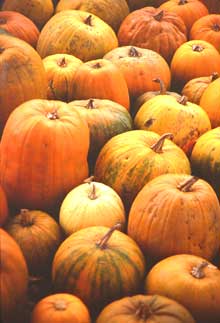
I've spent most of my farming years in awe of the earth's constantly changing surprises. It's a biological system, not a mechanical one. I remind myself of this each time something like the weather affects my mortal plans, each time a crop is delayed or doesn't emerge from depths that are too cool, too warm, too wet, or too dry.
Yet, every year I plan to stretch the seasons, hoping to show up at the farmers' market with the first string beans, the latest corn or tomatoes, or the earliest and sweetest peaches. I constantly try, as Wes Jackson so aptly puts it, "to substitute human cleverness for nature's wisdom." Each year I imagine myself a little wiser, a little better prepared to outsmart the pests, the rain, the wind, the heat, or the cold. Truth is, my part in the miraculous drama played out in these fields and orchards each day and night is really very small.
As if to remind me of this, it is nearly Halloween and I find myself making daily pilgrimages to the pumpkin patch, hoping that the large round globes that are still green have begun to turn. I have cut off the water; I look up at the sky each day in search of a ripening heat. I squint to measure imperceptible changes from dark green to not-so-dark green. I have even resorted to double-checking the calendar to see if I've counted wrong, if I might squeak out an extra day or two before the witches and goblins arrive.
Down the street at the local supermarket, the produce buyer does not share my worries. He won't have to concern himself with climate, or soil, or days until harvest. His supermarket is always ready for its holiday duty. He orders pumpkins from Texas, Indiana, or Mexico. Or from Mars if he has to. With one phone call, a truckload of pumpkins will appear on the loading dock in plenty of time to be gutted and carved into scary faces lit with candles. No one will be disappointed.
I, on the other hand, have a problem. My field is full, littered with large fruits, thick stems tilting at odd angles toward the sky. The setting would be spectacular, except for one thing-not a hint of color, not even a patch of yellow, let alone orange. And while I blame the weather, the fault lies in a simple number - 81. The label on the can of 'Connecticut Field' pumpkin seed had been clear about that - 81 days. I planted in mid-August. I had cut it too close, squeezed for time when the previous crop in that field came on late. I could have had pumpkins on time, I think to myself, if conditions had been just right. But are they ever?
I have always preached that in gardening and farming, timing is everything. Cultivating at just the right moment can save hours of work later on; harvesting at peak brings to the table food that is wholesome and full of flavor; working the ground when the soil moisture is not too dry or too wet affects every step thereafter; planting a crop at just the right time determines success or failure. Knowing this I plot and plan. I carefully select seeds and varieties and too often forget that nature will have her own way. The real process is not so much in the actions of the grower but in what takes place after he or she has set the stage.
I may miss Halloween this time, but with this financial disappointment comes a curious satisfaction, that I work within a system that remains bigger and more mysterious than human deadlines. We don't make all the rules, and when we have worked hard in our fields, done all that we can to plant and tend and protect and nurture, then we must step back and wait and watch and pray.
A former contributing editor to National Gardening, Michael Ableman operates Fairview Farms in Goleta, California.
Photography by National Gardening Association